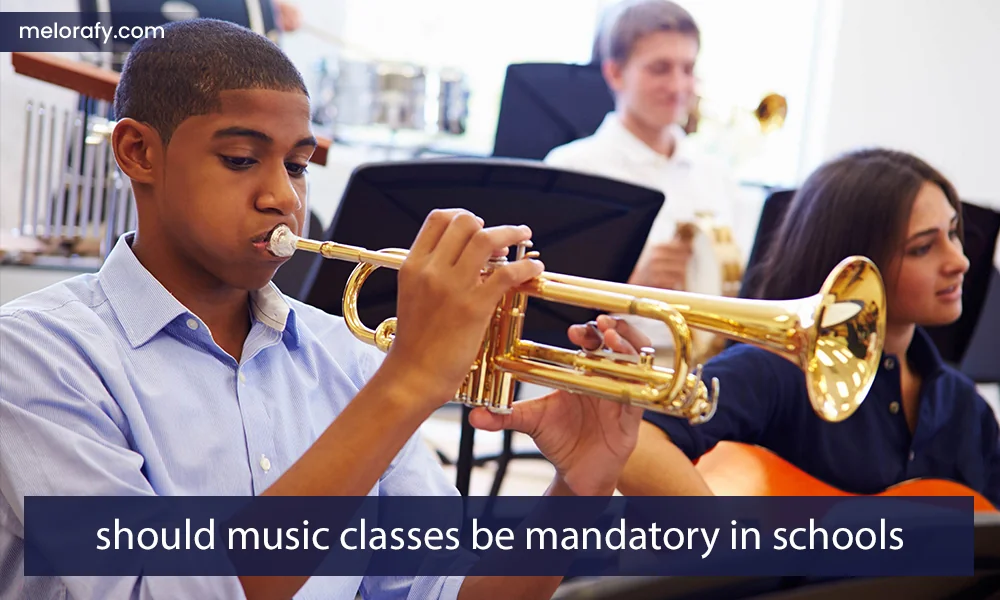
should music classes be mandatory in schools
In the debate over school curricula, the question of whether music classes should be a compulsory part of education or not, often comes to mind. As schools face increasing pressure to prioritize core academic subjects, the value of music education is sometimes overlooked. However, integrating music classes into the compulsory curriculum can provide many benefits that go beyond the classroom. This article from Melorafy explores the reasons why making music classes compulsory in schools could be the right decision to raise educated people.
Enhancing Cognitive Development
Research has consistently shown that exposure to music education can significantly enhance cognitive development in children. Engaging with music, whether through listening, singing, or playing an instrument, stimulates various areas of the brain involved in language, memory, and spatial intelligence. Making music classes mandatory ensures that all students have the opportunity to develop these crucial cognitive abilities.
Cultivating Emotional and Social Skills
Music education is not just about learning notes and rhythms; it’s a powerful tool for emotional expression and understanding. Participating in music classes allows students to explore their emotions, leading to greater self-awareness and emotional intelligence. Furthermore, music often involves collaboration, whether in bands, orchestras, or choirs, teaching students valuable lessons in teamwork, empathy, and communication.
![]()
Fostering Creativity and Problem-Solving
In a world that increasingly values innovation, music education offers a unique platform for creative expression and problem-solving. Composing music, improvising, and performance all require students to think outside the box and develop innovative solutions to artistic challenges. By making music classes mandatory, schools can cultivate a culture of creativity that students can apply in all areas of their lives.
Promoting Cultural Awareness and Diversity
Music is a universal language that transcends cultural barriers. Through music education, students are exposed to a wide range of musical traditions and genres from around the world. This exposure fosters a deeper understanding and appreciation of cultural diversity, preparing students to thrive in a globalized society.
Addressing Equity in Education
Making music classes mandatory can also address issues of equity in education. Access to private music lessons is often limited to those who can afford them, creating a gap in music education. By providing all students with music classes, schools can help bridge this gap, ensuring that every child has the opportunity to explore their musical potential.
The Argument Against Mandating Music Classes
While the benefits of music education are clear, some argue against making music classes mandatory, citing concerns over curriculum overcrowding and the need to focus on STEM (Science, Technology, Engineering, and Mathematics) subjects. However, integrating music education doesn’t mean diminishing the importance of other subjects. Instead, it’s about recognizing that a well-rounded education includes the arts, which are crucial for developing a wide range of skills and competencies.
![]()
Bridging Academic and Artistic Worlds Through Music
The integration of music classes into the mandatory school curriculum serves as a bridge between the academic and artistic worlds, enriching the educational experience. By doing so, schools can challenge the false dichotomy that often exists between the sciences and the arts, demonstrating that both are essential for comprehensive education.
The Practical Benefits of Music Education
Beyond the intrinsic value of music, there are practical benefits that further justify its inclusion as a mandatory subject. Skills developed through music education, such as discipline, persistence, and attention to detail, are highly transferable. Students learn the importance of practice and dedication in achieving proficiency, lessons that are applicable to any field of study or career.
Music Education and Mental Health
In today’s fast-paced and often stressful educational environments, music classes offer a much-needed respite for students. Engaging in music, whether through creation or appreciation, has been shown to reduce stress, alleviate anxiety, and improve overall mental health. Making music education mandatory ensures that all students have access to this outlet, promoting well-being across the student body.
Strengthening School Communities
Music has a unique power to bring people together, and this is especially true within schools. Bands, orchestras, and choirs are not just extracurricular activities; they are communities where students form lasting bonds. By making music classes mandatory, schools can strengthen their communities, creating a sense of belonging and shared purpose among students.
Preparing for a Diverse Future
As the world becomes increasingly interconnected, the ability to appreciate and understand diverse cultures becomes more important. Music education exposes students to a variety of musical traditions, helping them to develop a global perspective. This understanding of cultural diversity is a critical skill for the leaders of tomorrow, making the case for music education even stronger.
Implementing a Balanced Curriculum
The challenge of implementing mandatory music classes lies in balancing the curriculum. Schools must navigate logistical and financial constraints while ensuring that music education complements other academic subjects. This may involve innovative scheduling, cross-curricular projects, and leveraging technology to enhance music learning experiences.
Encouraging Lifelong Engagement with Music
One of the most profound benefits of making music classes mandatory is the potential to inspire a lifelong engagement with music. For some students, school music classes may be their first and only opportunity to learn an instrument, sing in a choir, or compose music. These experiences can ignite a passion for music that lasts a lifetime, enriching their personal lives and the cultural fabric of society.
The debate over making music classes mandatory in schools touches on fundamental questions about the purpose of education. Is the goal merely to prepare students for the workforce, or is it to cultivate well-rounded individuals with a broad range of knowledge and skills? By embracing music education as a mandatory part of the curriculum, schools can ensure that students not only excel academically but also grow as creative, emotionally intelligent, and culturally aware individuals. In the end, a harmonious approach to education, one that includes music as a core component, may be the key to preparing students for both the challenges and opportunities of the future.